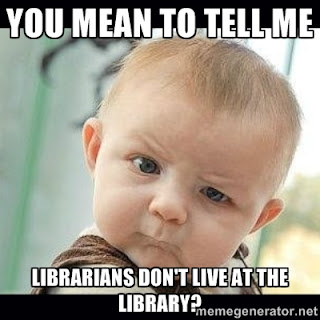I
recently attended the Lead the Change conference
at Nashville Public Library, sponsored by Library Journal. David Bendekovic was
the speaker, and he encouraged us to realize that regardless of our job titles,
everybody in the library needs to think of themselves as a marketer to meet the
changing needs of existing patrons and reach new users. I found this especially
important as I have been working to clean up our patron
database and accept the challenge from Sandra Nelson to keep our users current
within a three-year span. Wow, that bit a chunk out of our registered borrowers
on file, and made me realize that we have a LOT of work to do to not only keep
current patrons active and constantly renewing their cards, but attracting new
users as well. We went as a system from having a total of 146,039 card holders
in 2011-12 down to 92,094 in 2014-15. This means we’ve removed around 50,000
inactive patrons from our database! It hurts to think of that loss, but I can
now say that our numbers are much more realistic. Unfortunately, this means
that we are now only reaching about 37% of our total service population, which
is 254,632 and growing.
In
leading the change, each of us leads within their sphere of influence. But in
order to lead, I need to know myself and my strengths. I encourage you to take
this free test to see what your areas of strength may be. This is a shortened
version of the Myers-Briggs personality test http://www.humanmetrics.com/cgi-win/jtypes2.asp but it is helpful to gain insights
into what makes you tick or perform the best. There are many tests like this
that can help us each better understand who we are and our strengths. Working
in our strengths gives us energy and enjoyment.
Once you
know yourself better, you can seek out areas of growth. This is one reason one
of our goals each year is to attend one training or webinar. We all have things
to learn related to our jobs, and the more we seek growth, the better able we
are to meet patrons’ needs and enrich the services of our library. The better
we are at living out our strategic plan and the key words of “explore, imagine,
engage”, the more our community knows what we stand for at LPLS.
Paul Simon
has a song which goes: “Once upon a time there was an ocean, but now it’s a
mountain range. Something unstoppable set into motion. Nothing is different,
but everything’s changed.” David Bendekovic tweaked this by saying: “Libraries:
Something unstoppable set into motion. Nothing is different, but everything’s
changed.” Libraries are creating an environment where people can come and
change their own lives.
I think we
are on the right track with our strategic plan and our vision of being the
place where people can explore the possibilities, imagine what
could be and engage in experiences that lead to growth as individuals
and a community. This is an ongoing conversation as we seek to lead from our
core values to be what people are interested in and thus engage them in an
on-going relationship.



